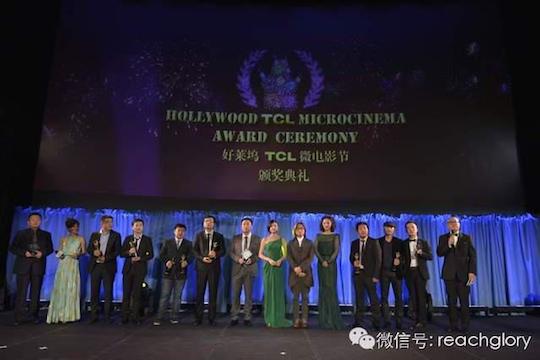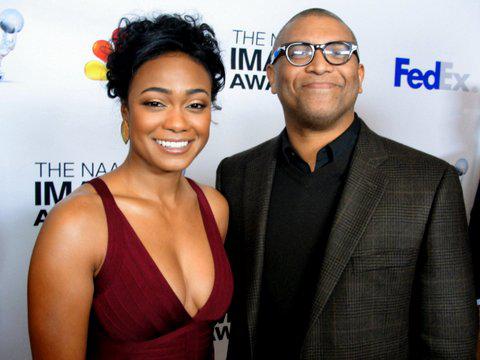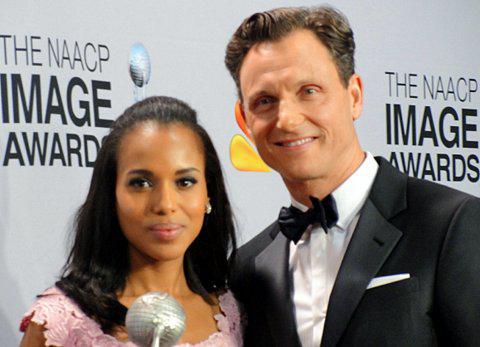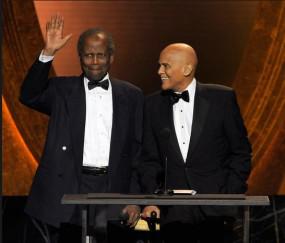
So a friend invites me to an award ceremony for short films from China. I love international cinema, so I’m down to go. Then I find out I’m giving out one of the awards! Then I look and see other presenters like producer Janet Yang, who worked with Oliver Stone and is making films in China now, and producer, who made the Oscar-winning The Life Of Pi, so I figure I’m in good company.

《被解救的姜戈》制片人Reginald Hudliné¢å¥–
I don’t know what this says, but that’s part of what’s cool about it.
Talk about it on HEF – the Hudlin Entertainment Forum
Comment
+ Permalink

Reginald Hudlin And Phil Gurin To Executive Produce The 45th NAACP Image Awards
Two-Hour Live Special to Air Saturday, February 22, 9PM/ET on TV One
LOS ANGELES, CA (DECEMBER 18, 2013) – Industry veterans Reginald Hudlin and Phil Gurin have been named co-executive producers of the 45th NAACP IMAGE AWARDS, it was jointly announced today by the NAACP and TV One. Winners will be revealed during the two-hour star-studded special to air live from the Pasadena Civic Auditorium on Saturday, February 22, 9PM/ET on TV One.
Hudlin, former president of BET, responsible for some of the highest rated shows in the history of the network and also created the “BET Hip Hop Awards,” as well as the “BET Honors.” In addition, Hudlin received an Academy Award and NAACP Image Award nomination as producer on Quentin Tarantino’s “Django Unchained.” Gurin has created an unprecedented number of variety specials, including major live events, concert performances, reality programs, clip shows and comedy series. Gurin’s shows have aired on every major U.S. broadcast network, many cable networks and in over 100 countries around the world. The production team will also include Tony McCuin as Director and Suzanne Bender and Stephanie Sacco as Talent Producers.

The event kicks off the landmark multi-year partnership announced between the NAACP and TV One earlier this year. The NAACP Image Awards is the nation’s premier event celebrating the outstanding achievements and performances of people of color in the arts as well as those individuals or groups who promote social justice. There are 54 competitive categories in the fields of motion picture, television, recording and literature, as well as several special honorary awards.
“The NAACP has enjoyed a terrific working relationship with Reginald Hudlin and is confident in his abilities to produce an entertaining and enjoyable show,” stated Chairman of the NAACP Image Awards, Leonard James. “We are pleased to add the talents of Phil Gurin and his team to what we are sure will be our best Image Awards Show to date.”
“As TV One prepares to air our very first Image Awards live broadcast, we are in excellent hands with Reginald Hudlin and Phil Gurin at the helm,” remarked Alfred Liggins, President and CEO, TV One. “Their combined experience and well-established production reputations will serve us well in our inaugural outing.”

“We are honored to have the opportunity to produce the 45th NAACP Image Awards as the show debuts on its new television home, TV One,” commented Hudlin and Gurin. “Working with the NAACP is always a privilege and we anticipate delivering another inspiring and star-studded show.”
Talk about it on HEF – the Hudlin Entertainment Forum
Comment
+ Permalink
NPR | Dec. 30, 2013
By Hansi Lo Wang

As we near the end of 2013, NPR is taking a look at the numbers that tell the story of this year — numbers that, if you really understand them, give insight into the world we’re living in, right now. You’ll hear the stories behind numbers ranging from zero to 1 trillion.
When it comes to race and film, the number of the year is 11.
I started the count recently at a movie theater just outside of Washington, D.C., where I met Kahlila Liverpool. We were there for a movie and a meal with the D.C. Black Film and Media Club, a local Meetup group that attends group screenings of films featuring black actors and by black directors.
Liverpool and I bought tickets to see Black Nativity, but there were three other films starring black actors and by black directors listed above the box office at the multiplex.
This year’s list, though, goes on to include a total of eleven films, each grossing from about half a million to more than $100 million. It’s almost double the number of last year’s group of comparable films, and it comes after perennial criticism of Hollywood’s lack of roles for black talent on and off screen.
“I was surprised at how many black films were out this year,” Liverpool said. “I told one of my friends in California, ‘Oh my gosh! There’s tons of black movies out! Did you notice that?’ “
Moviegoers and critics have also noticed the range of this year’s eleven films that shatters the stereotype of “black film.”
They span the gamut of genres from Oscar bait introducing audiences to untold historical epics (12 Years a Slave and Lee Daniels’ The Butler) and smaller dramas about urban life (Fruitvale Station, The Inevitable Defeat of Mister and Pete) and about marital infidelity (Temptation: Confessions of a Marriage Counselor), to a Christmas musical (Black Nativity), plus romantic comedies (The Best Man Holiday, Baggage Claim and Peeples) and more straight-up comedies (Kevin Hart: Let Me Explain and Tyler Perry’s A Madea Christmas).
(Besides the top-grossing eleven, there were also smaller films starring black actors, by black directors that received shorter theatrical runs including Andrew Dosunmu’s Mother of George and Sheldon Candis’ LUV. A number of this year’s films by black directors, such as Spike Lee’s Oldboy and Antoine Fuqua’s Olympus Has Fallen, featured white actors in leading roles. Black actors also had a number of leading roles in films directed by white and Asian-American directors, including Mandela: Long Walk to Freedom, 42, and After Earth.)
A Boom-And-Bust Cycle
Filmmaker Reginald Hudlin, a producer for Django Unchained who wrote and directed the 1990 hit House Party, says he’s not all that surprised by this year’s long list of films.
“There’s a number of market forces that all came together and made something possible,” he explains, “The most important thing about Hollywood is that it works on historical precedent.”
In recent years, that precedent has been set by successful black filmmakers like Tyler Perry, whose films have consistently raked in tens of millions of dollars at the box office.
Hudlin says they’ve proven time and time again that films with black actors, by black directors can reach a large audience. He also credits a growing behind-the-screen network of black film executives and producers helping to nurture projects.
But he warns this year’s crop of films follows a traditional boom-and-bust cycle in Hollywood.
“We saw in the 1970s an explosion of black filmmakers, then not so much. Then in the 80s and 90s, we had another explosion of black filmmakers, and then not so much,” he says.
In 1992, Hudlin directed the big-budget Eddie Murphy comedy Boomerang, which featured an all-star cast including Halle Berry, Robin Givens, Chris Rock, David Alan Grier, Martin Lawrence, and Eartha Kitt.
The film came out in the same year as Spike Lee’s biopic Malcolm X starring Denzel Washington in an Oscar-nominated role, plus thrillers like Ernest Dickerson’s Juice with Tupac Shakur and Omar Epps, Kevin Hooks’ Passenger 57 starring Wesley Snipes and Bill Duke’s Deep Cover with Laurence Fishburne. There were also smaller releases including Julie Dash’s historical drama Daughters of the Dust and Bébé’s Kids, an animated film featuring black protagonists directed by Bruce W. Smith and written by Hudlin.
‘End’ Of An Era?
For Hudlin, it all seemed to add up to a turning point.
“We thought, ‘OK, here we are! We’re switching gears! We’re going to the next level!’ ” he says, “But the fact is that was the end of an era.”
That era can be kept alive with a more solid infrastructure of support in Hollywood, according to Wesley Morris, a film critic for Grantland who has seen all eleven of this year’s group of films.
Only one of them — Universal Pictures’ The Best Man Holiday — was produced by a major Hollywood studio.
“They can’t all just be independent movies. They can’t all just be movies about slaves. And they can’t all star the same three actors,” Morris says, “And I think this year, you got a real sense that that is definitely something that is not only possible, but it’s viable as well.”
Back at the movie theater, Liverpool, who is African-American, told me that seeing more black actors in films by black directors provides not just more entertainment options, but also personal affirmation.
“It’s really important to validate my experience and see some of my experiences portrayed on screen,” she said.
Still, what Liverpool doesn’t see enough of on screen is black women in leading roles.
Only three of this year’s top eleven films starring black actors, by black directors were carried by a lead female role. Of the three, one was played by the writer-director-producer of Tyler Perry’s A Madea Christmas— himself.
Talk about it on HEF – the Hudlin Entertainment Forum
Comment
+ Permalink







